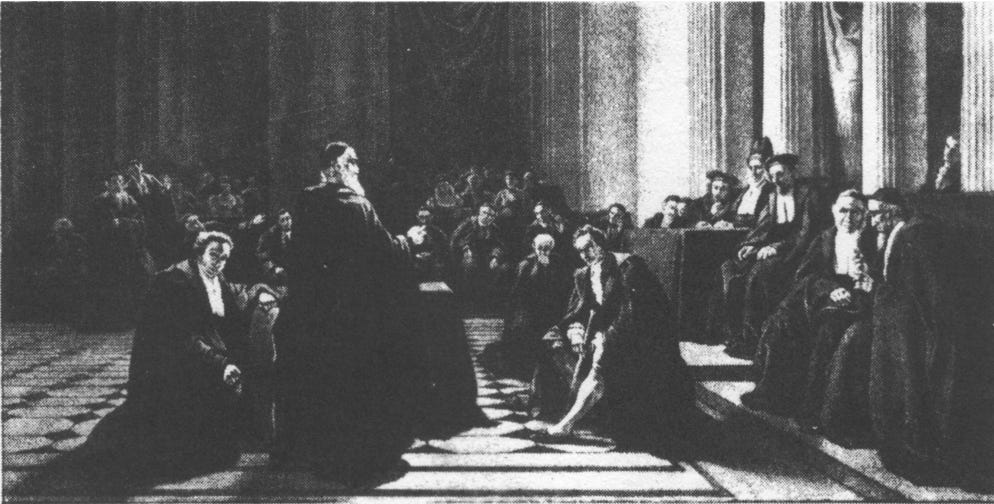In 1806, the newly crowned emperor in Paris summoned 112 leading representatives of Judaism from France, Germany, and Italy and publicly asked them the questions that had been trying humans for centuries. Complaints against the Jews had been pouring in from across France, and Napoleon sought to put an end to the problem once and for all. Napoleon’s main questions:
were French gentiles “strangers” to French Jews or “brothers,”
did French Jews consider themselves French natives, subject to French jurisdiction and French law, or not,
under Judaic law, could a Jew marry a non-Jew, and
were Jewish and Christian debtors treated differently under Jewish law?
The delegation of Jews—the Sanhedrin—strongly expressed their loyalty to France and renounced the “nation-within-a-nation” orthodoxy. In the wake of this Napoleonic interrogation and the Jewish affirmation, Jews were granted full political rights in all the countries of Europe. In the United States, Jews had always had full political rights. But, it was different in Russia. Even though Russia kept pace with the rest of the West in other aspects of the 19th century’s liberalizations (Russia abolished slavery and freed its slaves two years before the United States did), in Russia, the country with the largest Jewish population, Jews remained under legal restrictions.

More precisely, Russian Jews were under two restrictive systems. The Tsarist and the Talmudic. The rabbis who held the power under the Talmudic system saw the attempts by Tsar Alexander II to emancipate the Jews as a threat to the absolute power they wielded over the shtetls. Alexander II tried, but was assassinated for his effort.
In the West, Jews were assimilating and regarded the Eastern Jews with hostility. They were particularly resistant to the Zionist movement, the Talmudic answer to Jewish emancipation, then growing in Russia side-by-side with the Communist movement. The breach in the wall of Western Jewry occurred with the publication in 1896 of The Jewish State, written by an Austrian Jew named Theodor Herzl. He was a Western Jew, but he had sided with the Eastern Jews and taken up the cause of Zionism. He claimed he had been convinced “antisemitism” was real by the Dreyfus affair and demanded “sovereignty be granted us over a portion of the globe large enough to satisfy the rightful requirements of a nation.” The book came under lively discussion within Jewry and Herzl went to London, where he found support for his idea. Encouraged, he called a meeting of world Jewry.
From Douglas Reed’s The Controversy of Zion:
Consequently, in March 1897, Jews “all over the world” were invited to send delegates to a “Zionist congress,” a counter-Sanhedrin, at Munich in August. The Western Jews were adamantly opposed. The rabbis of Germany, and then the Jews of Munich, protested, and the place of meeting was changed to Basel, in Switzerland…1
When Herzl’s congress met most of the 197 delegates came from Eastern Europe. This group of men then set up a “World Zionist Organization,” which proclaimed Jewish nationhood and “a publicly secured, legally assured home” to be its aims, and Herzl declared “The Jewish State exists.” In fact, a few Jews, claiming to speak for all Jews but vehemently repudiated by many representative bodies of Western Jewry, had held a meeting in Basel, and that was all…
Looking back fifty years later, Rabbi Elmer Berger observed, “Here was the wedge of Jewish nationalism, to be driven between Jews and other human beings…
[Herzl] made the discovery [of the strength of the Talmudic Jews in Russia] at that first World Zionist Congress, called by him in such confident expectation of mass-support: “and then … there rose before our eyes a Russian Jewry, the strength of which we had not even suspected…”
Dr. Herzl found himself face to face with his masters and with the conspiracy, which through him was about to enter the West. He had declared war on emancipation and, like many successors, was unaware of the nature of the force he had released…
Six years later, at the Sixth World Zionist Congress, Theodor Herzl, having played his part, would be cast aside by those same Eastern Jews. During the interim, however, the Austrian journalist traveled between the capitals of Europe as a political superstar. He sought and obtained access to kings, presidents, and ministers. He spoke for all Jews, he said, and no door was closed to him.
By this time, Zionism’s littermate, Communism, had established itself in the old track of Professor Weishaupt’s Illuminati and had secret cells in every Western country, a fact known to Western leaders and the source of no small concern among them. Herzl’s tack was to promise the domestic tranquility of Western nations in return for their support for a refuge for persecuted Jews—a nation of their own.
Reed:
Thus he told a Grand Duke of Baden that he would diminish revolutionary propaganda in Europe in proportion to the support that his territorial ambition received from high authority. Then he was received by the behelmeted Kaiser, mounted on a charger, at the very gates of Jerusalem, and the emperor agreed to present to the Sultan Herzl’s proposal for a Zionist chartered company in Palestine under German protection. When nothing came of this Herzl threatened the Kaiser, too, with revolution: “If our work miscarries, hundreds of thousands of our supporters will at a single bound join the revolutionary parties.”2
In other words, the Zionist cause had immediate access to the pinnacles of power, and it was run like a Brooklyn protection racket.
Who opened these doors to the highest political leaders of the Western world? Surely, a single meeting of 197 Jewish individuals in which a resolution had been passed would not carry the weight necessary to command the attention of kings and presidents. Yet, Herzl moved with ease in and out of the highest political circles.
In 1903, Herzl turned his attention to the one place where Jews were not politically equal—Russia. Here was the place from which Jews needed refuge. Russia was the source of the persecution that justified Herzl’s mission in life, and the source of the antisemitism that kept Jews from drifting off with humanity. And Russia was the place where every effort to relieve the persecution, to emancipate the Jews, was fiercely resisted—up to and including through the use of assassination—by the victims of it.
Traveling through Russia on his way to Moscow, Herzl was met with messianic adulation by the Jewish masses, laboring under their own kind of ignorance, and by the time he reached the capital, he must have been feeling quite eminent. In Moscow, he met with high-ranking Russians, including the Tsar. Then he reported back to the rabbinate.
Herzl was, apparently, a true naif. He told the leaders of the Eastern Jews that he thought it would strengthen his hand with the Russians if the Russian Jews were to cease their revolutionary activity for a period. (Russia was soon to endure yet another revolution, in which, spoiler alert, Jews played a leading role.) He told the rabbinate that he thought if the Eastern Jews were to suspend their revolutionary activity, he could even get the Tsar to agree to a full political emancipation of the Jews. [crickets in the shtetl]
At the Sixth World Zionist Congress later that year, Herzl announced he had secured a commitment from the government of Great Britain for the establishment of a Jewish state—a place of refuge for the persecuted Jews of the world. Uganda! In the vote whether to accept the offer, Herzl’s proposal won, but without the support of the Eastern Jews, who turned their backs on him and walked out. It was a stinging rebuke. Afterwards, Herzl went to the Eastern Jews’ conference room. He walked in to dead silence. He spoke to dead silence. He walked out to dead silence. His political career was dead. Within the year, he, himself, was dead at the age of 44.
There was one group of Jews, however, who were wildly enthusiastic about Herzl’s proposal to “return” the Zionists to Uganda instead of Palestine. And that group was the Jews who already lived in Palestine. Along with their Christian and Muslim neighbors, the Palestinian Jews thought Uganda would be the perfect place for these aliens—the persecuted Khazar Zionists of Eastern Europe.
Reed:
What the masses of people wanted, Jewish or Gentile, was from 1903 of no account. Acceptance or refusal made no difference; the offer had been made, and by it the West and its future were involved in an enterprise foreseeably disastrous. As Dr. Weizmann says, a British government by this act [the offer of Uganda] committed itself to recognize the Talmudists from Russia as the government of all Jews; thereby it also committed future generations of its people, and the similar commitment of the American people was to follow a decade later, when the path had been prepared.
Out of that act of 1903 came the beginning of this century’s tribulations. The story of Zion thereafter became that of Western politicians who, under “irresistible pressure,” did the bidding of a powerful sect. 1903 was the conspiracy’s triumphant year, and for the West it was to prove as ominous as 1914 and 1939, which years both took their shape under its shadow.3
At the same congress during which Theodor Herzl suffered his humiliating defeat in 1903, his top lieutenant, Max Nordau made this remarkable statement:
Let me tell you the following words as if I were showing you the rungs of a ladder leading upward and upward: Herzl, the Zionist congress, the English Uganda proposition, the future world war, the peace conference where, with the help of England, a free and Jewish Palestine will be created
Upon Herzl’s death, Dr. Chaim Weizmann, the future first president of Israel, led the attack on the Uganda offer and at the Seventh Congress, of 1905, the acceptance, at his instigation, was revoked. The Zionist movement was now completely under the control of the Talmudic rabbinate in the East. In 1906, the rabbis sent Weizmann to England, where the Prime Minister of England, Arthur James Balfour, met Weizmann in a hotel room and was captivated by the notion of presenting Palestine, which was not his to give, to “the Jews.” According to Balfour’s niece and life-long confidante,
[Lord Balfour’s] interest in the subject was whetted … by the refusal of the Zionist Jews to accept the Uganda offer … The opposition aroused in him a curiosity which he found no means to satisfy … He had asked his chairman in Manchester to fathom the reasons for the Zionist attitude … Balfour’s interest in the Jews and their history … originated in the Old Testament training of his mother and in his Scottish upbringing. As he grew up his intellectual admiration and sympathy for certain aspects of the Jews in the modern world seemed to him of immense importance. I remember in childhood imbibing from him the idea that Christian religion and civilization owed to Judaism an immeasurable debt, ill repaid.”4
Lord Balfour, with his primitive understanding of religion, thought that God had a political plan, that he, Lord Balfour, knew what it was, that God needed Lord Balfour’s help to pull it off, and that God’s political plan involved committing a massive injustice against the people of Palestine. Lord Balfour became a committed Zionist, not out of any sense of political duty to the people of England, but out of a sense of religious duty to the bloodthirsty tribal deity, Jehovah.
Next, Weizmann wanted to meet with a Lord Percy, who, like Lord Balfour, was descended from an old family with generations of statesmanship behind him. Reed:
A young Englishman, with some modest petition, would have great trouble even today in penetrating the janitorial and secretarial defences of a Cabinet minister’s private room. Young Dr. Weizmann from Russia, who wanted Palestine, was quickly ushered into that of Lord Percy (“in charge of African affairs”).5
Lord Percy, too, was “a deeply religious man” and was scandalized at the thought of the Holy Land being in Uganda. Weizmann went away with assurances of his support for the Zionists’ Palestinian object from another Western politician who didn’t know enough to keep the political realm separate from the religious realm.
The proposal that Weizmann made to Balfour in his hotel room required in the scheme of things that Turkey would be England’s enemy in any future war. The next time they met, December 14, 1914, that world war had just begun; Turkey was, indeed, England’s enemy, and “the youth of Britain was rushing to join in the battle, whose great cause was supposed to be that of overthrowing ‘Prussian militarism,’ liberating ‘small nations,’ and restoring ‘freedom and democracy.’” But the millions of young Christian men who would die in the carnage that lay ahead, would die for a wholly different reason, best expressed by Lord Balfour at their second meeting, as reported by Dr. Weizmann, “I was thinking about that conversation of ours,” he began, “and I believe that when the guns stop firing you may get your Jerusalem.”6
When that group of theologians—God experts—met in the 5th century AD and decided to attach the Hebrew Torah to the Christian Testament and pronounce them of “equal divine authority,” it was a blunder of cataclysmic proportions.
World War I, from which the West has never recovered, was the first war between nations, not armies. The war was predicted eleven years before it was declared. It was predicted by those who had made themselves expert at manipulating nations from behind the scenes. Eleven years before the outbreak of the war, and three years before Weizmann’s first meeting with Balfour, Max Nordau stated at the Sixth World Zionist Congress that as a consequence of the future world war, Great Britain, which had no more right to give Palestine to anyone than Jehovah did, would give Palestine to the Jews. To the extent Lords Balfour and Percy and other Christian Zionists in the British government (including a young Winston Churchill, just elected to his first term in Parliament) played the roles assigned to them out of their religious beliefs, the 5th century theological blunder that permitted the attachment of the Judaic Torah to the Christian Testament and gave them equal divine authority was responsible for the carnage of WWI.
Our “Christian nation” shamefully pays for the bombs that splatter the brains of children against the stone walls7 of Palestine. And just like the Christian Zionists today who are cheering on the Old Testament atrocities being committed in Gaza, Lords Balfour and Percy, as far as can be determined, considered neither the treatment of the people of Palestine nor the well-being of their own people when they hung the chains of Zionism around the Western neck.
The Reform Jews of America two years earlier had announced that they expected “neither a return to Palestine … nor the restoration of any of the laws concerning the Jewish State.”
“Happy the one who takes and dashes Your little ones against the rock!” Psalms 139:7







The Old Testament does seem to have paved the way for our current Zionist morass.
Lords Balfour and Percy are important examples of powerful Brits who were misled by the influence of the OT on their religious persuasions. There is an interesting argument I've heard from Europeans that the American Puritans were similarly infected, and that that is at the root of what some have called the Judaic-American mind-set.
Dr. Tomislav Sunic has an interesting post on this perspective on The Occidental Observer today, excerpted from a book he wrote almost two decades ago.
https://www.theoccidentalobserver.net/2023/10/25/homo-judaicus-the-political-theology-of-us-foreign-policy/
"Metaphysically speaking, Israel is the spiritual origin of the American divine world mission and the incarnation of American ideology itself. Only within the context of a strange filial relationship with Jewishness and Israel can one understand why America is accepting with equanimity its own deliberate decline into a world-wide morass in the early 21st century — especially since America’s foreign policy actions stand in sharp contrast to the originally proclaimed goals of America’s founding fathers."
Great synopsis Craig. I'd always been hazy on Napoleon's role in liberating the Jews. I think he later wrote that he regretted it.
A friend on FB is traveling in Sicily. She posted a photo of a 5th century mosaic that depicted the Piscean fish inside the Star of David. This dates to the time you mentioned when Christianity took on Yahweh's albatross instead of following Marcion's Jew-free lead.